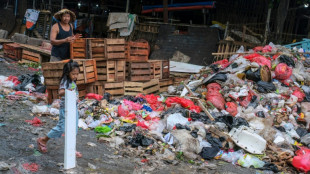
-
 Williams 'on the back foot' after missing Barcelona: Albon
Williams 'on the back foot' after missing Barcelona: Albon
-
Real Madrid submit evidence to UEFA in Vinicius racism probe

-
 Olympics rev up Milan's renewal but locals fear price to pay
Olympics rev up Milan's renewal but locals fear price to pay
-
Cardona Coll, Fatton win Olympic-debuting ski mountaineering sprint golds

-
 MSF will keep operating in Gaza 'as long as we can': mission head
MSF will keep operating in Gaza 'as long as we can': mission head
-
Russian Filippov wins first medal at Milan-Cortina Games for individual neutral athletes

-
 Italian Milan takes sprint honours at UAE Tour
Italian Milan takes sprint honours at UAE Tour
-
Dozens killed in jihadist attacks in northwest Nigeria

-
 Zimbabwe unbeaten in T20 World Cup after six-wicket Sri Lanka win
Zimbabwe unbeaten in T20 World Cup after six-wicket Sri Lanka win
-
Postecoglou admits taking Nottingham Forest post a 'bad decision'

-
 Switzerland's Fatton wins women's ski mountaineering sprint on Olympic debut
Switzerland's Fatton wins women's ski mountaineering sprint on Olympic debut
-
Kinghorn, Van der Merwe return for Scotland against Six Nations strugglers Wales

-
 Repsol says could boost Venezuela oil output over 50% in 12 months
Repsol says could boost Venezuela oil output over 50% in 12 months
-
UN says Israeli actions raise 'ethnic cleansing' fears in West Bank, Gaza

-
 Arteta tells faltering leaders Arsenal to harness Wolves 'pain' against Spurs
Arteta tells faltering leaders Arsenal to harness Wolves 'pain' against Spurs
-
Crowley gets nod for Irish as Prendergast drops out

-
 Unbeaten Swiss to meet Great Britain in Olympic men's curling semis
Unbeaten Swiss to meet Great Britain in Olympic men's curling semis
-
UK police arrest ex-prince Andrew on suspicion of misconduct

-
 Oil extends gains on US-Iran tensions, Europe stocks slide
Oil extends gains on US-Iran tensions, Europe stocks slide
-
Former prince Andrew, a historic downfall

-
 Sri Lanka post 178-7 against Zimbabwe ahead of T20 Super Eights
Sri Lanka post 178-7 against Zimbabwe ahead of T20 Super Eights
-
OpenAI's Altman tells leaders regulation 'urgently' needed

-
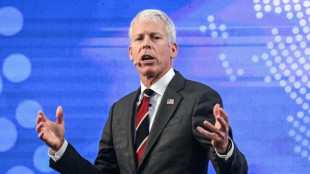 US renews threat to leave IEA
US renews threat to leave IEA
-
Liverpool boss Slot says Isak in 'final stages of rehab'

-
 Airbus ready to build two new European fighter jets if 'customers' ask
Airbus ready to build two new European fighter jets if 'customers' ask
-
UN Sudan probe finds 'hallmarks of genocide' in El-Fasher
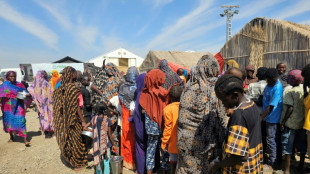
-
 Costelow starts, Hamer-Webb makes Wales debut in Six Nations clash with Scotland
Costelow starts, Hamer-Webb makes Wales debut in Six Nations clash with Scotland
-
Facing US warnings, Iran defends right to nuclear enrichment

-
 Ex-South Korea leader Yoon gets life in prison for insurrection
Ex-South Korea leader Yoon gets life in prison for insurrection
-
OpenAI's Altman says at India summit regulation 'urgently' needed

-
 British couple held in Iran sentenced to 10 years
British couple held in Iran sentenced to 10 years
-
West Indies ease past Italy to tune up for T20 Super Eights

-
 At least 16 killed after building collapses in Pakistan following blast
At least 16 killed after building collapses in Pakistan following blast
-
Summit photo op fails to unite AI startup rivals
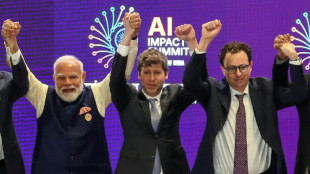
-
 OpenAI's Altman says world 'urgently' needs AI regulation
OpenAI's Altman says world 'urgently' needs AI regulation
-
Horror comics boom in our age of anxiety

-
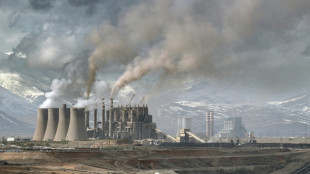 Turkey fires up coal pollution even as it hosts COP31
Turkey fires up coal pollution even as it hosts COP31
-
London fashion week opens with tribute to one of its greats

-
 Ex-S.Korea leader Yoon gets life in prison for insurrection
Ex-S.Korea leader Yoon gets life in prison for insurrection
-
Pea soup, veggie mash contest warms up Dutch winter

-
 South Korea's Yoon: from rising star to jailed ex-president
South Korea's Yoon: from rising star to jailed ex-president
-
Private companies seek to import fuel amid Cuban energy crisis

-
 India search for 'perfect game' as South Africa loom in Super Eights
India search for 'perfect game' as South Africa loom in Super Eights
-
India's Modi calls for inclusive tech at AI summit

-
 Airbus planning record commercial aircraft deliveries in 2026
Airbus planning record commercial aircraft deliveries in 2026
-
Elections under fire: Colombia endures deadliest campaign in decades

-
 Traore backs 'hungry' Italy against France in Six Nations
Traore backs 'hungry' Italy against France in Six Nations
-
All-rounder Curran brings stuttering England to life at the death

-
 South Korea court weighs death sentence for ex-president Yoon
South Korea court weighs death sentence for ex-president Yoon
-
Tech chiefs address India AI summit as Gates cancels


In climate fight, rich nations must give up oil first: report
Rich countries must end their oil and gas production by 2034 to cap global warming at 1.5 degrees Celsius and give poorer nations time to replace fossil fuel income, according to a report released Tuesday.
The 70-page analysis from the Tyndall Centre for Climate Change Research comes as nearly 200 nations kicks off a two-week negotiation to validate a landmark assessment of options for reducing carbon pollution and extracting CO2 from the air.
The overarching objective, enshrined in the 2015 Paris Agreement, is to cap global warming "well below" 2C, and 1.5C if possible.
A torrent of research since 2015, along with a crescendo of deadly extreme weather across the globe, has confirmed that the lower aspirational target is by far a safer threshold.
Some poorer nations produce only a tiny percentage of global output but are so reliant on fossil fuel revenues that rapidly removing this income could undercut their economic or political stability, the Tyndall Centre report shows.
Countries such as South Sudan, the Republic of Congo and Gabon have little economic revenue apart from oil and gas production.
By contrast, wealthy nations that are major producers would remain rich even if fossil fuel income were removed.
Oil and gas revenue, for example, contribute eight percent to US GPD, but the country's GDP per capita would still be about $60,000 -- second highest in the world among oil and gas producing nations -- without it, according to the report.
"We use the GDP per capita that remains once we've removed the revenue from oil and gas as an indicator of capacity," lead author Kevin Anderson, a professor of energy and climate change at the University of Manchester, told AFP.
There are 88 countries in the world that produce oil and gas.
"We calculated emissions phase-out dates for all of them consistent with the Paris Agreement temperature goals," Anderson said.
"We found that wealthy countries need to be at zero oil and gas production by 2034."
- First coal, then oil & gas -
The very poorest countries can continue to produce out to 2050, according to the calculation, and other countries such as China and Mexico are somewhere in between.
When countries signed the Paris climate treaty, it was accepted that wealthy nations should take bigger and faster steps to decarbonise their economies and provide financial support to help poorer countries wean themselves of fossil fuels.
The principle has already been applied to coal-power generation, with the UN calling on rich OECD countries to phase out coal use by 2030, and the rest of the world by 2040.
The new report, Phaseout Pathways for Fossil Fuel Production, applies the same approach to oil and gas.
For a 50/50 chance of limiting the rise in global temperatures to 1.5C, 19 countries in which per capita GDP would remain above $50,000 without oil and gas revenue must end production by 2034.
Included in this tranche are the US, Norway, Britain, Canada, Australia and the United Arab Emirates.
Another 14 "high capacity" nations where per capita GDP would be about $28,000 without income from oil and gas must end production in 2039, including Saudi Arabia, Kuwait and Kazakhstan.
The next group of countries -- including China, Brazil and Mexico -- would need to end output by 2043, followed by Indonesia, Iran and Egypt in 2045.
Only the poorest oil and gas producing nations such as Iraq, Libya and Angola could continue to pump crude and extract gas until mid-century.
"This report illustrates only too clearly why there also needs to be an urgent phase-out of oil and gas production," said Connie Hedegaard, former European Commissioner for climate, and Danish minister for climate and energy.
The Russian invasion of Ukraine, she noted, has "made it abundantly clear that there are numerous reasons why the world needs to get off its dependence on fossil fuels."
Romain Ioualalen, global policy lead at Oil Change International, said the report is a "stark indictment of the climate failure" of wealthy nations.
"Rich countries have twelve years to end their production of oil and gas but none has any plans to do so," he said.
"In fact, not only do they still account for more than a third of global production, but they also plan to produce five times as much oil and gas by 2030 as is compatible with the trajectory outlined in this report."
O.Johnson--AMWN



